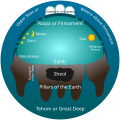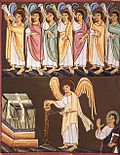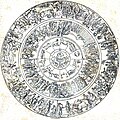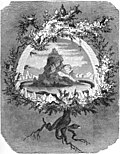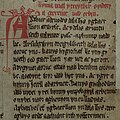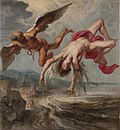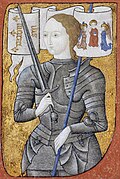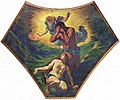
Back بوابة:الأساطير Arabic Portal:Mythologie BAR Portal:Mitologia Catalan Portal:Mythologie German Πύλη:Μυθολογία Greek Portal:Mitología Spanish Portail:Mythologie French Portal:Mitologi ID Portale:Mitologia Italian Portal:神話伝承 Japanese
The Myths Portal


Myth is a genre of folklore consisting primarily of narratives that play a fundamental role in a society. For scholars, this is very different from the vernacular usage of the term "myth" that refers to a belief that is not true. Instead, the veracity of a myth is not a defining criterion.
Myths are often endorsed by religious (when they are closely linked to religion or spirituality) and secular authorities. Many societies group their myths, legends, and history together, considering myths and legends to be factual accounts of their remote past. In particular, creation myths take place in a primordial age when the world had not achieved its later form. Origin myths explain how a society's customs, institutions, and taboos were established and sanctified. National myths are narratives about a nation's past that symbolize the nation's values. There is a complex relationship between recital of myths and the enactment of rituals. (Full article...)
Selected article -
Chamunda (Sanskrit: चामुण्डा, IAST: Cāmuṇḍā), also known as Chamundeshwari, Chamundi or Charchika, is a fearsome form of Chandi, the Hindu mother goddess, Mahadevi and is one of the seven Matrikas.
She is also one of the chief Yoginis, a group of sixty-four or eighty-one Tantric goddesses, who are attendants of the warrior goddess Parvati. The name is a combination of Chanda and Munda, two demons whom Chamunda killed. She is closely associated with Kali, another fierce aspect of Parvati. She is identified with goddesses Parvati, Kali or Durga. (Full article...)
Did you know? -
- ... that Reeri Yakseya, who is believed to be the most cruel and powerful demon in Sinhalese folklore, can assume 18 different apparitions?
- ... that in Inuit mythology, an Angakkuq, or shaman, is told to be able to fly with the assistance of a spirit companion, or tuurngaq?
- ...that Maximón, a saint venerated in the highlands of Guatemala, drinks whiskey, smokes cigarettes and grants prayers for revenge?
- ... that Xiuhtecuhtli (mask pictured), the Aztec god of fire, was one of the nine Lords of the Night even though he was a solar deity?
Recognised content
Featured Articles:
![]() Ahalya,
Ahalya, ![]() Ancient Egyptian literature,
Ancient Egyptian literature, ![]() King Arthur,
King Arthur, ![]() Ganesha,
Ganesha, ![]() Iravan,
Iravan, ![]() Orion (mythology),
Orion (mythology), ![]() Vampire,
Vampire, ![]() Vithoba
Vithoba
Featured Lists:
![]() List of valkyrie names in Norse mythology
List of valkyrie names in Norse mythology
Good Articles:
![]() 2012 phenomenon,
2012 phenomenon,
![]() Æsir–Vanir War,
Æsir–Vanir War,
![]() Ala (demon),
Ala (demon),
![]() Anu,
Anu,
![]() Aphrodite,
Aphrodite,
![]() Athena,
Athena,
![]() Ardhanarishvara,
Ardhanarishvara,
![]() Battle of Barry,
Battle of Barry,
![]() Bhikshatana,
Bhikshatana,
![]() Catalogue of Women,
Catalogue of Women,
![]() Chamunda,
Chamunda,
![]() Chhinnamasta,
Chhinnamasta,
![]() Consorts of Ganesha,
Consorts of Ganesha,
![]() Cú Chulainn,
Cú Chulainn,
![]() Dhumavati,
Dhumavati,
![]() Dumuzid,
Dumuzid,
![]() Einherjar,
Einherjar,
![]() Eir,
Eir,
![]() Enlil,
Enlil,
![]() Fairy Flag,
Fairy Flag,
![]() Fenrir,
Fenrir,
![]() Gerðr,
Gerðr,
![]() Hel (being),
Hel (being),
![]() Huginn and Muninn,
Huginn and Muninn,
![]() Iðunn,
Iðunn,
![]() Ila (Hinduism),
Ila (Hinduism),
![]() Inanna,
Inanna,
![]() Kabandha,
Kabandha,
![]() Kali,
Kali,
![]() Kamadhenu,
Kamadhenu,
![]() Kangiten,
Kangiten,
![]() Keshi (demon),
Keshi (demon),
![]() Khandoba,
Khandoba,
![]() Kratos (mythology)
Kratos (mythology)
![]() Krishna,
Krishna,
![]() Kubera,
Kubera,
![]() LGBT themes in Hindu mythology,
LGBT themes in Hindu mythology,
![]() Manasa,
Manasa,
![]() Mandodari,
Mandodari,
![]() Matangi,
Matangi,
![]() Matrikas,
Matrikas,
![]() Maya Sita,
Maya Sita,
![]() Mohini,
Mohini,
![]() Myrrha,
Myrrha,
![]() Mythology of Carnivàle,
Mythology of Carnivàle,
![]() Naraka (Hinduism),
Naraka (Hinduism),
![]() Ninurta,
Ninurta,
![]() Prester John,
Prester John,
![]() Prithu,
Prithu,
![]() Putana,
Putana,
![]() Rati,
Rati,
![]() Ratatoskr,
Ratatoskr,
![]() Revanta,
Revanta,
![]() Satyavati,
Satyavati,
![]() Satyr,
Satyr,
![]() Sharabha,
Sharabha,
![]() Shashthi,
Shashthi,
![]() Shiva,
Shiva,
![]() Sif,
Sif,
![]() Tara (Ramayana),
Tara (Ramayana),
![]() Troilus,
Troilus,
![]() Tuisto,
Tuisto,
![]() Valhalla,
Valhalla,
![]() Valkyrie,
Valkyrie,
![]() Vampire folklore by region,
Vampire folklore by region,
![]() Varaha,
Varaha,
![]() Varahi,
Varahi,
![]() Veðrfölnir and eagle
Veðrfölnir and eagle
![]() Zduhać
Zduhać
Wikiversity
Selected creature -

In Hindu mythology, Keshin (Sanskrit: केशिन्, lit. 'the hairy one/long-haired' IAST: Keśin), also called Keshi (Sanskrit: केशी IAST: Keśī) is a horse-demon, killed by Krishna, an Avatara of Vishnu. The demon was dispatched by Krishna's evil uncle Kamsa, who was destined to die at Krishna's hands.
The tale of the slaying of Keshi is told in the Hindu scriptures of Bhagavata Purana, Vishnu Purana and Harivamsa. Krishna is often praised as Keshava - the slayer of Keshi - in scriptures. (Full article...)
General images
Subcategories
WikiProjects
Things you can do
- Help with the myth and folklore missing articles project.
- Help create requested articles.
- Help assessment at Wikipedia:WikiProject Mythology/Assessment.
- Place the project banner {{WikiProject Mythology}} on the talk pages of all relevant articles.
- Check the recent changes for recent improvements, vandalism, and other changes.
- Answer requests for mythology articles needing attention: Category:Mythology articles needing attention
- Answer requests for mythology articles needing expert attention: Category:Mythology articles needing expert attention
- Expand articles tagged as mythology stubs: Category:Mythology stubs
- Assist mythology subprojects.
- Add requested photographs of mythology subjects: Category:Wikipedia requested photographs of mythology subjects
Associated Wikimedia
The following Wikimedia Foundation sister projects provide more on this subject:
-
Commons
Free media repository -
Wikibooks
Free textbooks and manuals -
Wikidata
Free knowledge base -
Wikinews
Free-content news -
Wikiquote
Collection of quotations -
Wikisource
Free-content library -
Wikiversity
Free learning tools -
Wiktionary
Dictionary and thesaurus
© MMXXIII Rich X Search. We shall prevail. All rights reserved. Rich X Search








